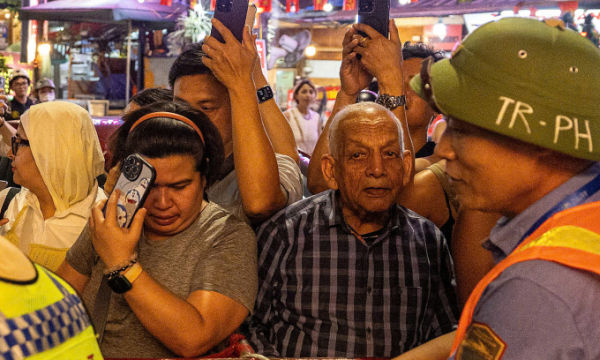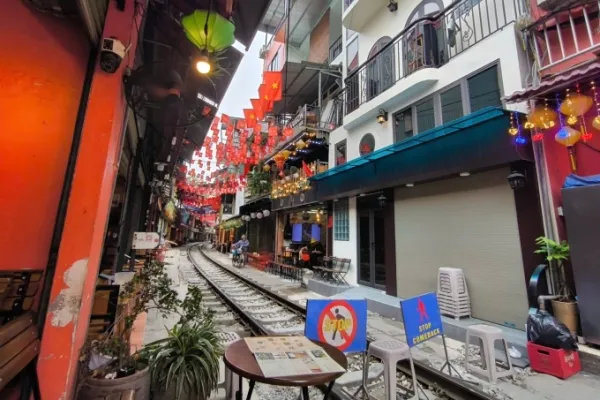
On the evening of June 14 hundreds of foreign tourists were asked to leave the area during the latest safety inspection just like they were three months earlier.
Dr. Trinh Le Anh, head of the department of event management at the University of Social Sciences and Humanities, Vietnam National University, Hanoi, said this leaves foreign visitors feeling uncomfortable and “is very offensive.”
“Tourists come here thinking it is a safe and legal attraction. But just minutes after sitting down, they’re asked to leave. It feels like herding ducks,” Anh said.
“This leaves a negative impression on visitors who choose Hanoi as their destination.”
|
Foreign visitors are asked to leave Hanoi’s train street on the evening of June 14, 2025. Photo by Hong Quang |
Loreill, a tourist from New Zealand, visited Train Street on June 16 and was surprised to find that the section in Hang Bong Ward was cordoned off but not in Cua Dong Ward.
She said she was unaware of any ban and had only visited the place after reading about it on travel websites.
“It is a really beautiful spot and has the potential to become one of Hanoi’s top attractions.”
Liu, a tourist from China, also visited the area that day and observed that shop owners often rush to the rail track to invite tourists to their cafes.
Nguyen Hoang Anh, vice chairman of Hang Bong Ward, acknowledged that ordering foreign tourists to leave sometimes leads to conflicts due to language barriers, affecting the city’s tourism image.
 |
|
A part of the Train Street in Hang Bong Ward is closed on June 16, 2025. Photo by VnExpress/Tu Nguyen |
Train Street, known for its railroad track closely flanked by cafes and homes, was officially closed to tourists in September 2022 due to safety concerns.
But barriers and security checkpoints have failed to deter crowds, especially on weekends, as many cafes continue to operate.
Authorities, unable to maintain a constant presence in the area to ensure safety, have arranged for officers to patrol in three daily shifts.
A recent viral video showing a tourist narrowly escaping serious injury while filming a train has reignited safety concerns.
According to Hang Bong Ward authorities, the incident happened at around 9:30 p.m. one day in September 2024, when most guards at the Train Street, who had worked from 8 a.m., had left their posts and gone home.
They said they had not been informed of the incident until the video surfaced online early this month.
After watching the footage, Anh said he felt “terrified,” calling it a stark warning of the daily dangers in the area.
“What’s most alarming is that even after such a serious incident, the area remains crowded, and shops continue to operate as if nothing happened.”
Experts said the solution lies not in blanket bans but in smarter, tourism-friendly strategies.
“The main issue is that no single agency has taken full responsibility for managing the site,” Anh said.
“There is a lack of a flexible legal model to turn the area into an official tourist destination.”
Experts said Vietnam could look to international examples.
Thailand’s Maeklong Railway Market, once considered hazardous, now thrives after authorities adjusted train schedules, installed safety barriers and posted guides.
In Sri Lanka, the Ella train line running through tea plantations is monitored using warning signs, surveillance cameras, trained guides, and insured tour operators.